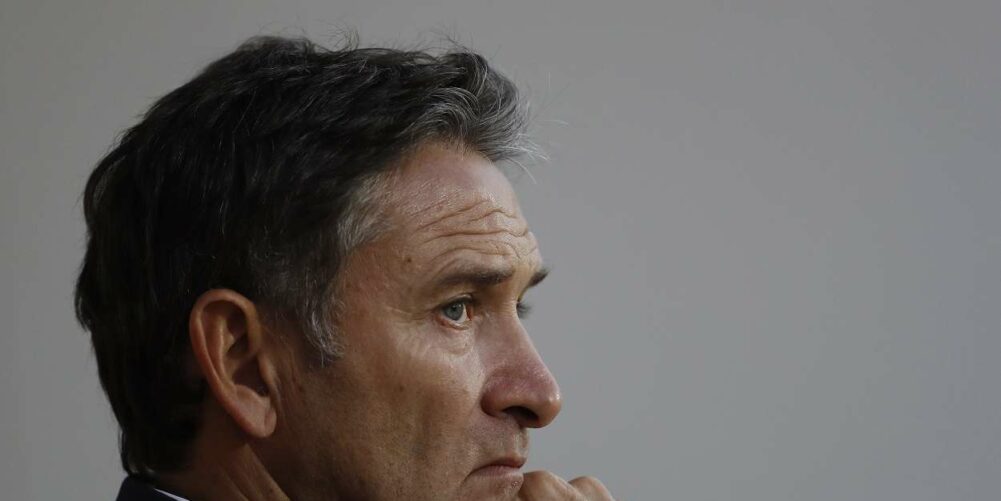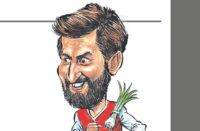ASK Philippe Montanier what he does for a living and the answer is always the same. “I am not a coach,” says the Nottingham Forest manager. “I am an educator.”
Now 51, the former goalkeeper has been dispensing lessons for almost 15 years, from the depths of the French regional leagues to the summit of La Liga.
For proof of his teaching talents, look no further than Antoine Griezmann, star of Euro 2016 and avowed fan of the man from Normandy.
Down on form and confidence when Montanier arrived at Real Sociedad in 2011, Griezmann says the encouragement of his compatriot reignited his career.
“I was in a slump, but it was all in my head,” recalled the forward, whose ten goals in the 2012-13 campaign helped Montanier's side finish fourth in the top flight.
“I have to thank Philippe because he was the one who believed in me. He is a person who gives you great confidence and belief in yourself. I improved a lot under him, not just as a player but also in my mentality.”
Those thoughts are echoed by Inigo Martinez. Now 25 and capped twice by Spain, the centre-back was an untested youngster when Montanier chucked him in at the deep end. So, too, was Asier Illarramendi, the defender who would later join Real Madrid for £30m.
“He is a coach who cares nothing for age,” explained Martinez. “He helps young people and wants them to improve. I appreciated it very much. A coach like him, who speaks to you, advises you, gives you tranquility and, above all, confidence, makes you feel better and stronger.”
Even in his short time at the City Ground, that magic has apparently rubbed off. Oliver Burke, the Forest teenager signed by RB Leipzig for £13m last month, praised Montanier's willingness to let him play freely.
For Montanier, allowing expression as a coach is an antidote to the restriction he felt at being stuck between the sticks.
Born into a family of goalkeepers – his father and brother both played semi-pro – his school and youth managers naturally jumped to conclusions.
“As soon as I showed an interest in football, they said ‘Ah, you are a Montanier. You must play in goal. My whole life I was a frustrated footballer.”
 The FLP's weekly profile is sponsored by Marathonbet: Odds here https://www.marathonbet.co.uk/en/
The FLP's weekly profile is sponsored by Marathonbet: Odds here https://www.marathonbet.co.uk/en/
Nicknamed Tanier (Shorty), due to his 5ft 10in stature, Montanier played for regional sides Pacy-sur-Eure and ALM Evreux before getting his break at Caen under veteran manager Robert Nouzaret in 1988. A decade later, the 72-year-old would offer Montanier a route into coaching at Toulouse.
“Robert was my role model,” said the Reds boss. “I really wonder what I would have done if I'd never met him. Maybe I'd have stayed in Pacy-sur-Eure doing social work. He's always been a hugely important figure and always will be.”
Though he tasted success – promotion and European qualification with Caen in a team featuring Graham Rix – Montanier's playing career was largely undistinguished. Perceptive enough to acknowledge his limitations, the focus was always on what came next.
Playing ran parallel to studies at the University of Caen, where he took sports science and earned a masters in management in 1991.
Eric Blahic, then a coach at Guingamp, studied with Montanier and the pair became close friends.
“Philippe had a natural charisma that made him a leader on the pitch but also outside it,” he recalled. “Managing people was completely natural to him. He was charming and also an outstanding talker.”
Blahic says Montanier harboured no dreams of coaching. “His thesis was about the re-training of professional players,” he said. “That was his passion, not training a professional club.”
Indeed, his first post-football role was as ‘sports director' at Caen. Realising the post was largely ceremonial, Montanier resigned after just two weeks.
Next came that apprenticeship under Nouzaret, curtailed when his mentor joined Montpellier in 2004.
Unwanted by the club hierarchy, Montanier reluctantly took charge at Boulogne-sur-mer, an ancient but struggling side in the French third tier.
Four years later, they were in Ligue 1. “He was a hard worker, but his great skill was being able to delegate,” said Boulogne president Jacques Wattez. “He surrounded himself with very good people.”
Successes since have been steady, rather than meteoric, with two impressive mid-table finishes at Valenciennes and European qualification with Sociedad. Stade Rennais, the club he joined in 2013, failed to adapt to his ideas and he was dismissed – for the first time ever – two years later.
Pinning down those ideas is difficult. Certainly there is trust in youth. “I have an affinity with young people,” he has said. “I want them to advance.”
There is also a focus on technique and repetition, a disdain for what he calls the “Anglo-Saxon” values of size and strength.
These convictions were calcified during an ‘internship' at Hadjuk Split in 2010. Puzzled by Croatia's ability to churn out elite sportspeople, Montanier learned that every child received a solid technical grounding before any other aspect was introduced.
Yet, if these are the bedrocks, the rest is malleable. Valenciennes were labelled the Barcelona of the north, yet Montanier disliked the title, arguing his side were less dogmatic.
Likewise, a perceived dependence on 4-3-3 was dismissed by the Frenchman, who insists his system must fit the players and not vice-versa.
One thing is certain though: enjoyment is paramount.
“For me, it's simple,” says Montanier. “I feel that I've never worked in my life. I have fun. I want my players to feel that way, too. That is the greatest lesson.”

















